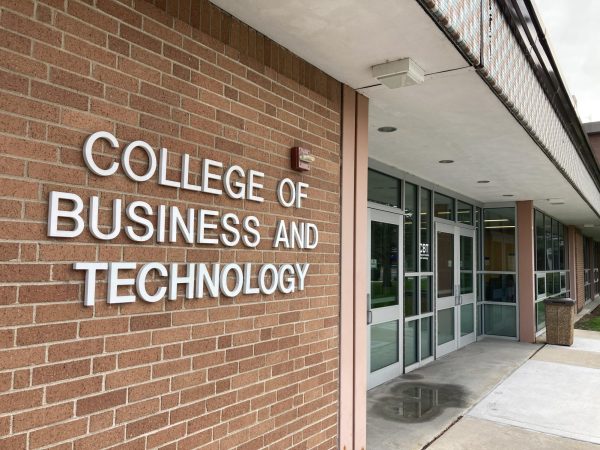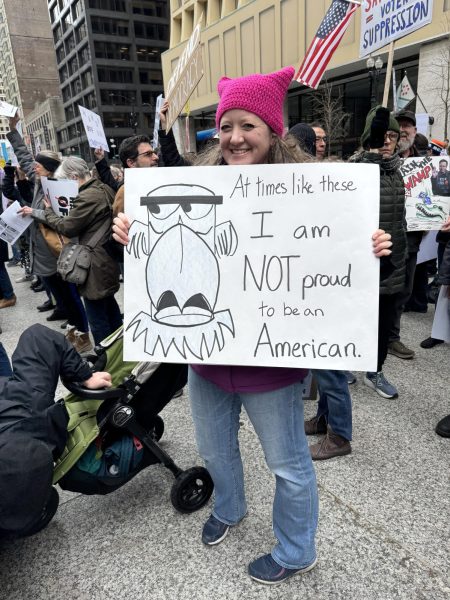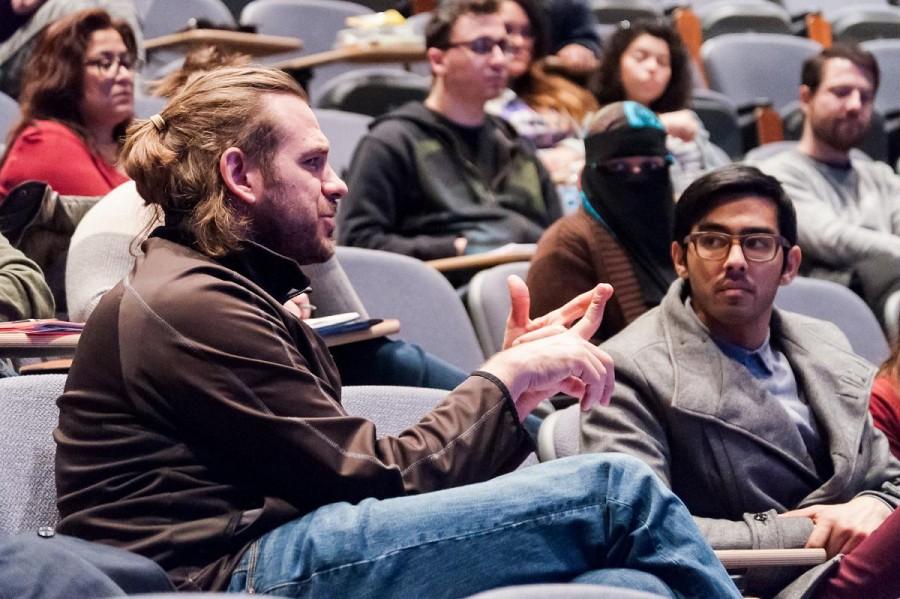Creating Grassroots Education
Anton Miglietta, co-director of Chicago Grassroots Curriculum Task Force moderating the student panel from the audience, “Because I’m a learner as well,” he says.
“Reversing Post Traumatic School Syndrome” was the theme for NEIU’s fifth annual Curriculum Fair, engaging in dialogue on the damages of education that fails to engage community and provide cultural relevancy.
The Curriculum Fair is put together every year by NEIU’s college of education in conjunction with Chicago Grassroots Curriculum Taskforce (CGCT). This year, in particular, NEIU’s college of education also included their education majors in the planning committee.
The Curriculum Fair consisted of various workshops, panel discussions, and teacher conversations. Morning panelists set the tone for the day by describing Grassroots Education as education that included “context, dialogue, and action.”
Parents, teachers, principals and NEIU’s own dean of the college of education all spoke on the morning panel. They differed in title, but all resonated with the words of Lindsay Smith from Citywide Education Assembly as she spoke on Grassroots Education, “finding our humanity and taking back knowledge and how it is constructed.”
Panelists were asked questions about policies and evaluation systems and how much these factors affect them and their students.
Anne Tran, a special education teacher from Finkl Elementary shared that the solution to working with strict new standards and budget cuts is to “kill isolation.”
Eric Reyes, a Raise Your Hand representative and a father, encouraged parent involvement and spoke on the impact it can create on standardized testing in schools, privatization, and underfunding.
Raise Your Hand started in 2010 and has since been an active coalition of parents and citizens whose mission it is to “help parents become advocates for their children by providing information on policies that impact them, building networks to share ideas, and creating tools to elicit change.”
As the morning panel came to a close, Maureen Gillette, the Dean of NEIU’s College of Education, added that “as future educators, showing a fear of penalty and/or losing your job is not something to ever worry about when what you are doing is making an impact on the lives of students and the community.”
The workshops that followed had a relatively diverse population of facilitators as the morning panel did, led by students, teachers, and representatives from CGCT.
Anton Miglietta, co-director of CGCT, led a workshop on “Creating a Justice Centered Curriculum.” The session consisted of a brief intro into the history of schooling and curriculum by covered topics such as: deculturalization, patriotizing, industrialism, consumerism, segregation, basic skill development, and anti-parental interventions.
The focus of this session was to not only understand the relevance of these influences on education but to reach “systematic analysis” or finding the root causes of these influences. For half of the session, NEIU students collaborated and searched for these root causes by connecting them to real-world issues faced in Chicago. School dropout rates, deportations, the war on drugs and alcohol, police brutality and gang violence were some of the issues discussed.
The other half of the session was spent on learning how to integrate student voices and experience into the curriculum. Some examples included surveying, field trips, writing proposals, and creating unit maps.
As educators or future educators, Miglietta believes one should “always ride for your students” and always push to provide new, engaging ways to incorporate real-life subjects into the flow of a classroom even if it means pushing boundaries and stepping out of a comfort zone.
Milli Salguero and Marialuisa Gonzalez from Juarez high school and Nancy Ibarra from Seward Elementary were part of the teacher discussions and spoke on “opting out” of the Partnership for Assessment of Readiness for College and Career test. A new standardized test required for high school students.
Briana Johnson from Uplift High School shared that standardized tests like PARCC “are promoting internal oppressions.” In fact, all students on the afternoon panel voiced a concern against standardized testing, uniform policies and education that didn’t have relevancy to their lives.
“It’s like, where’s the humanity? Where’s the love?” said a student from Rudy Lozano Leadership Academy who argued she rather be tested on how she can change a community rather than take a standardized test.
Dontay Williams from Gage Park high school and Voices of Youth in Chicago Education shared an anecdote on uniform policy, “I’m feeling good, right? So I decide to wear a blue shirt cause I’m feeling good. But I get to the security and they ask, ‘where’s your uniform shirt?’ and then they send me home. I don’t understand how the shirt was going to affect my education, I really wanted to stay in school that day.”
The afternoon sessions of the forum all ended with workshops specifically geared towards audiences of facilitators, college students, pre-service teachers and students from grades K-12 as well as their teachers. The facilitators of those meetings were all there to help put together a plan of action, to leave the forum with a momentum of change that they would bring back into their educational environments.
Disclosure: Emmanuel Gonzalez, news editor for the Independent, participated in the student panel portion of the CGCT Curriculum Fair
Your donation will support the student journalists of Northeastern Illinois University's The Independent, either in writers' payment, additional supplies and other items of note. Your contribution will allow us to purchase additional equipment for writers/photographers/illustrators and cover our annual website hosting costs.






